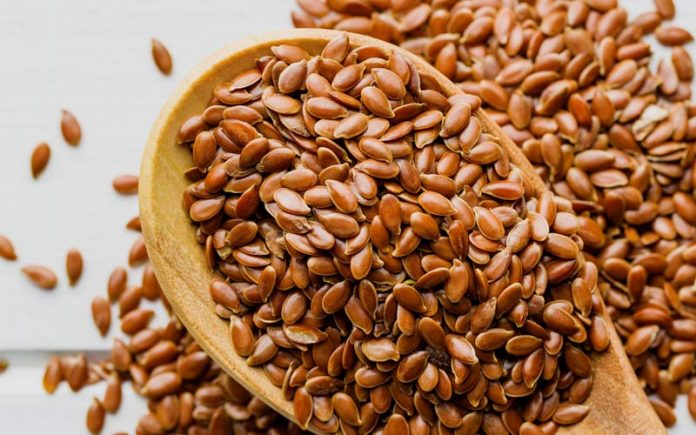Flaxseed, also called linseed, is derived from the flax plant (Linum usitatissimum). It grows throughout Asia, Europe, and the Mediterranean. These seeds are typically golden yellow to reddish-brown and contain phytoestrogen, a hormone related to oestrogen. Flaxseeds contain oil as well as soluble fiber.
Flax seeds are among the most versatile seeds. They may now be found in oatmeal, acai, smoothies, and other cuisines. However, many years ago, they were primarily utilized to make textiles. Flax seeds are becoming increasingly popular as they are becoming more health-conscious and mindful of the foods they consume.
It is hardly surprising given their numerous health benefits. When it comes to the advantages of flaxseeds, one of the most important is weight loss. As per a research done under World Obesity Federation, subjects who consumed whole flaxseed for more than 12 weeks had a positive effect on their body composition. It primarily benefits overweight and obese people who can lose weight with its use for more than three months.
In another research, weight loss and cardiovascular risks were in people from in different age groups between 23 to 49 years. People in all age groups showed improvements in systolic blood pressure, total cholesterol, and weight loss.
This article outlines what flax seeds are, where they originate from, the numerous advantages they provide, how they aid in weight reduction, potential adverse effects, and the various ways to consume them.
Nutritional Facts For Flax Seeds
One tablespoon (10 grams) of whole flax seeds contains the following nutrients:
- Calories: 55
- Water: 7%
- Protein: 1.9 grams
- Carbs: 3 grams
- Sugar: 0.2 grams
- Fiber: 2.8 grams
- Fat: 4.3 grams
Must Read: Pineapple Benefits for Weight Loss
Flax Seeds Are Rich in The Following Vitamins and Minerals
- Thiamine: required for proper metabolism and neuronal function.
- Copper: Copper is necessary for growth, development, and various biological processes.
- Molybdenum: An essential nutrient that has been found to play an important role in assisting enzymes that metabolize carbohydrates, protein, and fats into energy.
- Magnesium: Helps with the formation of bones, tissue, and red blood cells.
- Phosphorus: Helps to maintain bone health and tissue structure.
Are Flax Seeds Good For Weight Loss?
Flax seeds are a vital part of your diet if you want to reduce or maintain weight. This is primarily due to its high fiber content. Fiber makes you feel full, which leads to decreased daily calorie consumption. Flax seeds, in other words, assist in decreasing your appetite by making you feel full. As a consequence, you don’t overeat to satisfy your appetite.
If you are wondering how to utilize flax seeds for weight reduction, you may add them to your meals, particularly during breakfast. Flax seeds are an excellent addition to your diet if you want to snack between meals or reduce your food intake. Furthermore, flax seeds might help you lose weight.
How Flax Seeds Aid Weight Loss
Flaxseeds are high in omega-3 fatty acids, ALA, proteins, dietary fiber, and antioxidants. They may help with weight loss by improving digestion, decreasing inflammation, and promoting satiety.
1. Flax Seeds Contain Omega-3 Fatty Acids
Flax seed consumption helps to balance the omega-3 to omega-6 ratio, lowering chronic stress and the potential for weight gain.
2. Flax Seeds’ Dietary Fiber Boosts Satiety
Flax seeds contain soluble and insoluble fiber (mucilage gums and cellulose. Soluble fiber generates a gel-like material in the digestive system, slowing food absorption. As a result, you will feel full for an extended period.
3. Flax Seeds Are High in Protein
Flaxseeds are high in protein, with 100 g containing around 18.29 g. Proteins aid in the development of lean muscle, which gives your body a sleek and toned appearance. Muscles also have a more significant number of mitochondria, which boosts your metabolism significantly.
4. Flax Seeds Have Few Calories
A tablespoon of ground flaxseeds has 55 calories. You also get 18 grams of protein and a lot of dietary fiber to keep you fuller for longer. With this technique, you may generate a calorie deficit, allowing your body to utilize glycogen and fat stores.
Ways To Eat Flax Seeds For Weight Loss
One can consume flaxseeds in a variety of ways. They can be eaten whole or ground. They are also available in the form of flaxseed oil. Furthermore, there are several other methods to integrate flax seeds into your regular diet:
- Dress your salad with flaxseed, either ground or whole, or as an oil.
- To reap the rewards, mix flaxseeds with yogurt.
- Drizzle ground flaxseeds over your cereal or oatmeal bowl for the morning.
- Blend flaxseeds into your smoothies. It also thickens the smoothie’s consistency.
- Flaxseeds may be used in baked items such as cookies, bread, and muffins.
- Flaxseeds can be added to chicken, beef, and fish recipes.
- add flaxseeds to your drinking water.
These are just a few on the list of common methods to consume flaxseeds. You can also experiment with other choices on your own.
Must Read: Kiwi Fruit Benefits for Weight Loss
Other Benefits of Flax Seeds
1. Could Help Lower Cancer Risk
Flaxseeds include a high concentration of lignans, which are plant chemicals with estrogenic and antioxidant characteristics. These substances are proven to reduce the chance of developing several forms of cancer and are incredibly beneficial to general health. Flax seeds are known to have up to 800 times more lignans than other plant diets.
2. It May Aid With Blood Pressure Control.
One of the numerous advantages of flax seeds is that they can reduce blood pressure. As a result, they are most beneficial to persons with high blood pressure.
3. Flax Seeds Provide Dietary Fiber.
Soluble fiber and insoluble fiber are the two primary forms of fiber. Soluble fiber slows the pace of digestion. It also makes the various intestinal contents more consistent. It also aids in blood sugar regulation and cholesterol reduction.
4. It May Help in Lowering Cholesterol Levels.
According to one research, those with high cholesterol who ingest flaxseed powder daily for three months may show a 17% reduction in their cholesterol levels. Simultaneously, “bad” LDL cholesterol levels may fall by approximately 20%.
5. May Reduce Diabetes Risk.
Flax seeds should be the next in the queue to be added to the diabetic diet. According to research, the insoluble fiber in flax seeds might decrease the release of sugar into the blood. As a result, it may aid in the reduction of blood sugar levels.
The Takeaway
Flaxseeds are extraordinary seeds that provide several health advantages. They can also help with weight loss dramatically. They also supply a lot of nutrients to the body. As a result, they boost the immune system and help to prevent the spread of numerous diseases. The nicest aspect is that you can eat them whole or ground in various ways.
However, it is essential to remember that flax seeds are not miracle workers. To reduce weight successfully, you should eat a nutritious diet and exercise consistently. Another aspect to take note of is the need for moderation. Stick to the suggested amount of flax seeds.
Flax Seeds FAQs
How Much Flaxseed Should I Take Daily For Weight Loss?
For optimal weight loss, experts recommend 2-4 teaspoons of flaxseeds daily. Excessive fiber consumption, on the other hand, might result in diarrhea or nutritional malabsorption.
What is The Best Time to Eat Flax Seeds For Weight Loss?
Flax seeds can be consumed both in the morning and at night. Some of its advantages, though, are more effective at various periods. For example, consuming them in the morning is a smart choice because they are strong in fiber and protein. It will also significantly increase your metabolism.
What Are The Negative Effects of Flaxseed?
- It can trigger allergies.
- It can cause diarrhea if not cooked properly.
- It can lower blood sugar levels in people with diabetes and people with low blood sugar levels (hypoglycemia).
- It may interfere with certain medications, including blood thinners, birth control pills, and cancer drugs (chemotherapy). If you’re on any of these medications, consult your doctor before adding flaxseed to your diet or taking it as a supplement — especially if you’re pregnant or breastfeeding.
Who Should Not Eat Flax?
During pregnancy, avoid using flaxseed and flaxseed oil. Flaxseed or flaxseed oil can occasionally induce an allergic response. Flaxseeds should not be consumed uncooked or unripe. Because flaxseed oil may reduce blood clotting, discontinue usage two weeks before elective surgery.
Is it OK To Take Flaxseed Every Day?
The daily recommended consumption of flaxseed is not included in the guidelines. However, most experts believe eating one to two tablespoons of flaxseeds daily benefits one’s health.









